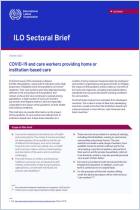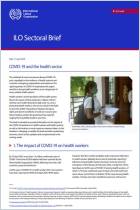Acesse a sua conta getAbstract para obter o resumo!

Acesse a sua conta getAbstract para obter o resumo!
OECD: Office of the Secretary General
Women at the Core of the Fight Against COVID-19 Crisis
OECD, 2020
Sobre o que é?
Women make up the majority of COVID-19 caregivers, working without pay at a time of economic vulnerability.
Recommendation
The COVID-19 pandemic renders women – who make up the majority of caregivers – uniquely vulnerable. They perform more unpaid labor in the home than usual, including teaching their children, while struggling economically. During stressful times, women face increased exposure to violence, exploitation, harassment and abuse. The Organization for Economic Co-operation and Development (OECD) recommends a holistic policy response that includes support for parents who are juggling work and child care, protecting women from violence, and replacing lost income, including for the self-employed.
Summary
About the Author
The Organization for Economic Co-operation and Development (OECD) is an international organization made up of 36 member nations that focus on developing policies to foster economic development.


















Comment on this summary